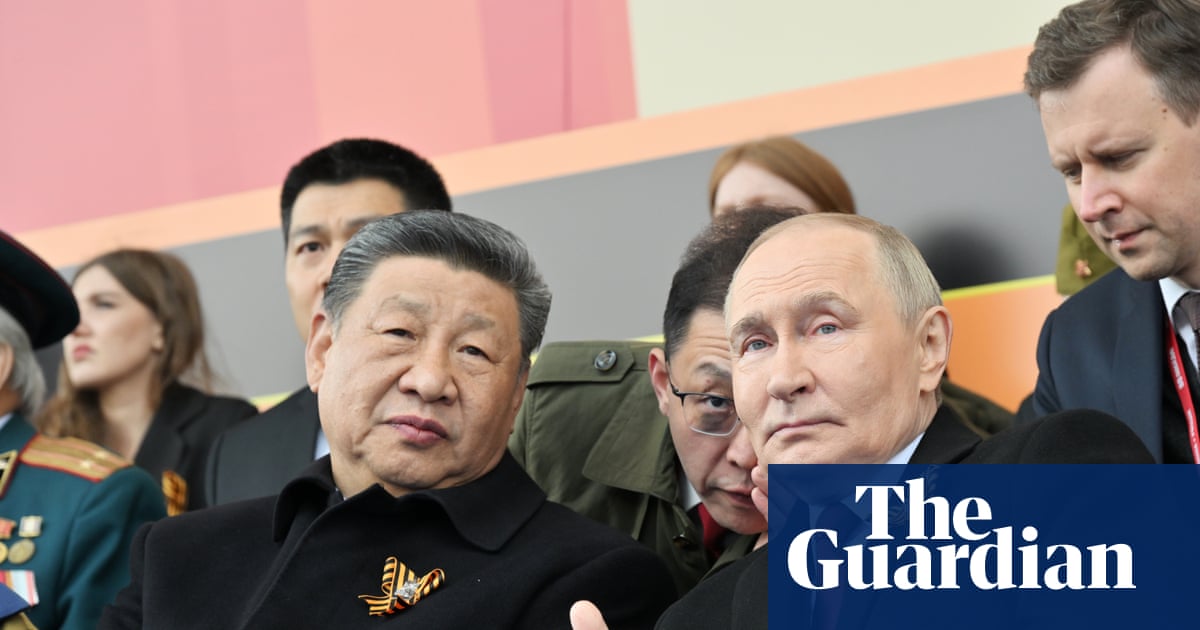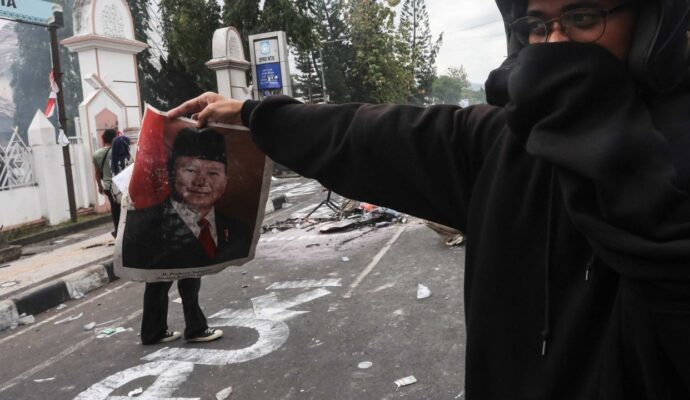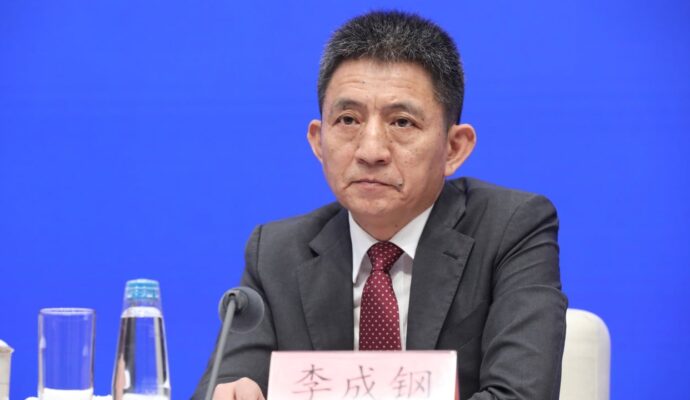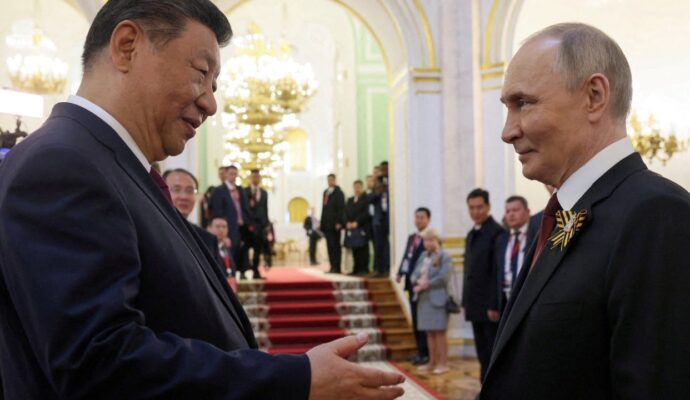
Vladimir Putin will travel to China this weekend for what the Kremlin has called a “truly unprecedented” visit to his most important ally, which comes at a crunch moment in talks over Ukraine.
During the trip, which is expected to stretch to close to a week – unusually long for the Russian leader – he will attend the Shanghai Cooperation Organisation summit, hold talks with Xi Jinping, and take in Beijing’s Victory Day military parade marking 80 years since Japan’s defeat in the second world war, where Putin is due to be the star guest alongside North Korea’s Kim Jong-un and leaders of Iran and Cuba.
Key on the agenda, analysts say, will be for Putin and Xi to align their positions on the war in Ukraine amid US efforts to end the fighting.
“It is an important time for them to talk about where the war is headed and how likely it is to be stopped in the near future,” said Alexander Gabuev, the director of the Carnegie Russia Eurasia Centre.
Gabuev said Moscow wanted to know whether it could expect any further assistance from China and how Beijing would respond if the US were to ask it to put pressure on Russia to end the fighting.
“The two leaders need to compare notes and make sure they are on the same page. This is important because the war has become one of the main pillars of their relationship,” he said.
China has emerged as an economic lifeline for Russia during the war in Ukraine, and Kyiv has been increasingly outspoken about what it says is China’s direct aiding of Moscow’s war effort.
Bilateral trade climbed to more than $240bn last year, two-thirds higher than before the invasion of Ukraine in 2022. Beijing is now the leading buyer of Russian oil and coal and will shortly surpass Europe as Moscow’s main market for natural gas.
Russia’s dependency on China is unlikely to go away even if the fighting stops, Gabuev said. “Russia wants to know whether China will buy more oil and gas in the long term,” he said.
While trade hit a record high in 2024, it has since dipped amid a slump in Russian oil exports to China, a trend Putin will be eager to reverse in Beijing. Specifically, the two sides are expected to discuss the long-suggested Power of Siberia-2 gas pipeline and plans to expand the existing oil link into China.
The talks are also likely to touch on deepening military cooperation between Beijing and Moscow, a development that has alarmed western governments.
While China has stopped short of providing direct military aid, US officials say Beijing has supplied about 70% of the machine tools and 90% of the semiconductors Russia needs to rebuild its war machine. In return, China is believed to be receiving assistance in sensitive defence technologies.
China claims it is a neutral mediator in the war in Ukraine, but the two countries have pulled closer together since the start of the invasion.
Russia recently floated the idea that Beijing should be among Ukraine’s security guarantors, reviving a proposal first put forward by Russian negotiators during talks in Turkey in spring 2022. Kyiv is likely to view the idea with scepticism.
There will be no shortage of symbolism during the visit. Putin is expected to sit alongside Xi at the military parade in Beijing on 3 September – a mirror image of the 9 May Victory Day celebrations in Moscow where the Chinese leader took pride of place as Chinese troops marched through Red Square beside their Russian counterparts.
The Tiananmen Square parade, like Russia’s own Victory Day rituals, allows Beijing to invoke the memory of wartime triumphs as a way of affirming its great-power status, analysts say.
“Russia and China share a similar view of history, casting themselves as the victorious powers of the second world war. This sense of shared destiny now underpins their partnership,” said Vasiliy Kashin, of the Institute of Far Eastern Studies of the Russian Academy of Sciences in Moscow.
Kashin said the celebrations, with Kim present, could give a chance to smooth over any tensions surrounding Moscow’s growing alliance with Pyongyang, a shift that has caused irritation in Beijing.
China has traditionally been North Korea’s closest ally, but has lost some influence since Russia’s invasion of Ukraine. Kim has sent thousands of troops to support Moscow’s war, and in return Russia has provided the isolated state with advanced missile and drone technology.
“Judging by Kim’s invitation to Beijing, China is looking for ways to restore its relations with the North Koreans,” Kashin said.
Putin’s visit will be closely watched in Washington, where Trump administration officials have promoted the policy of trying to prise Moscow away from Beijing and tilt it back towards the US.
Yet most analysts dismiss such hopes. “Relations between Russia and China will always be close,” Kashin said. “A scenario in which Russia would turn against China, or China against Russia, is impossible.”
The two leaders meet at a moment when each feels emboldened. China has managed to stave off a trade war with the US, which earlier this month extended its truce with Beijing for another 90 days as Washington sought to avoid reigniting a conflict that rattled global markets in the spring. Beijing flexed its muscle by imposing strict export controls on rare earths that threatened US manufacturing.
Trump has also refrained from threatening secondary sanctions on Beijing over its purchases of Russian oil, while instead targeting India.
Russia, meanwhile, has brushed aside Trump’s threats of penalties unless it halts the war, clinging to its maximalist demands and intensifying its campaign against Ukraine.
Tellingly, the Trump administration has so far applied little pressure on Xi to push Putin towards ending the war. Observers said that while Beijing would prefer the fighting in Ukraine to stop, it is willing to tolerate the conflict so long as it can prioritise trade and diplomatic ties with Moscow and extract favourable terms.
“China remains clear-eyed about the slim prospects for peace and sees little reason to accelerate talks,” Gabuev said. “They know that Russia and Ukraine remain very far apart. No one is really asking China to step in – and that suits Beijing, since it can continue with imitation diplomacy without doing much in reality.”


